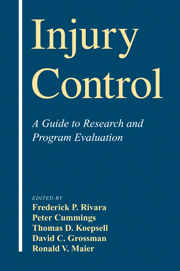Book contents
- Frontmatter
- Contents
- List of Contributors
- 1 An Overview of Injury Research
- 2 Classifying and Counting Injury
- 3 Measurement of Injury Severity and Co-morbidity
- 4 Data Linkages and Using Administrative and Secondary Databases
- 5 Rates, Rate Denominators, and Rate Comparisons
- 6 Data Collection Methods
- 7 Selecting a Study Design for Injury Research
- 8 Qualitative Methods in Injury Research
- 9 Randomized Trials
- 10 Cohort Studies in Injury Research
- 11 Case–Control Studies in Injury Research
- 12 Ecologic Studies
- 13 Case Series and Trauma Registries
- 14 Systematic Reviews of Injury Studies
- 15 Evaluating an Injury Intervention or Program
- 16 The Development of Clinical Decision Rules for Injury Care
- 17 Trauma Performance Improvement
- 18 Measuring Disability and Quality of Life Postinjury
- 19 Economic Evaluation of Injury Control
- 20 Ethical Issues
- Index
13 - Case Series and Trauma Registries
Published online by Cambridge University Press: 16 October 2009
- Frontmatter
- Contents
- List of Contributors
- 1 An Overview of Injury Research
- 2 Classifying and Counting Injury
- 3 Measurement of Injury Severity and Co-morbidity
- 4 Data Linkages and Using Administrative and Secondary Databases
- 5 Rates, Rate Denominators, and Rate Comparisons
- 6 Data Collection Methods
- 7 Selecting a Study Design for Injury Research
- 8 Qualitative Methods in Injury Research
- 9 Randomized Trials
- 10 Cohort Studies in Injury Research
- 11 Case–Control Studies in Injury Research
- 12 Ecologic Studies
- 13 Case Series and Trauma Registries
- 14 Systematic Reviews of Injury Studies
- 15 Evaluating an Injury Intervention or Program
- 16 The Development of Clinical Decision Rules for Injury Care
- 17 Trauma Performance Improvement
- 18 Measuring Disability and Quality of Life Postinjury
- 19 Economic Evaluation of Injury Control
- 20 Ethical Issues
- Index
Summary
Introduction
Case series are one of the original and most basic forms of medical research, dating back to our earliest attempts to understand illness and its origins. Until recently, much of our knowledge of the clinical manifestations of disease was based on descriptions of persons with similar sets of symptoms, often seen or cared for by one individual.
Case series are usually considered a less rigorous means of investigation than more analytic strategies, such as case–control or cohort studies. However, it is important to point out the importance of case series to the advancement of knowledge through the years. As a brief example, Sir Percival Pott described the occurrence of an unusual disease, scrotal cancer, in chimney sweeps in eighteenth century England and inferred an etiologic relationship with their occupation. This was a case series and represented the first description of carcinogenesis (Pott, 1778; Cummings and Weiss, 1998). In modern times, the global epidemic of acquired immune deficiency syndrome was heralded by a case series of homosexual men with the unusual combination of Kaposi's sarcoma and Pneumocystis carinii pneumonia (Centers for Disease Control, 1981). Likewise, in the study of injury, the first indications of the risks associated with air bags came from individual case reports and small case series (Ingram, 1991; Rimmer and Shuler, 1991; Huelke et al., 1992; Blacksin, 1993; Lancaster et al., 1993).
This chapter will explore the uses of case series data for the assessment of clinical care, as well as understanding the etiology of injuries.
Keywords
- Type
- Chapter
- Information
- Injury ControlA Guide to Research and Program Evaluation, pp. 168 - 182Publisher: Cambridge University PressPrint publication year: 2000
- 1
- Cited by

